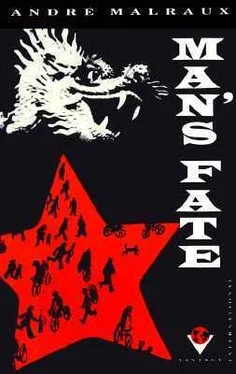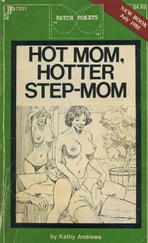“If you. stop flogging the idiot,” said Kyo, “I’ll give. you fifty dollars. when I get out.”
The warder hesitated.
“All right,” he said finally.
He turned away and Kyo felt such a release of tension that he thought he would faint. His left hand was so painful that he could not shut it. He had raised it at the same time as the other to the level of his shoulders, and it remained there, extended. New bursts of laughter.
“You want to shake hands?” asked the warder, also making fun of him.
He shook it. Kyo felt that in his whole life he would not forget this clasp, not because of the pain, but because life had never imposed upon him anything more hideous. He withdrew his hand, fell back in a sitting posture on the low bench. The warder hesitated, tossed his head, then began to scratch it with the handle of the whip. He returned to his table. The idiot was sobbing.
Hours of monotonous abjection. At last soldiers came to fetch Kyo to take him to the Special Police. No doubt he was going to his death, and yet he left with a joy whose violence surprised him. It seemed to him that he was leaving behind a loathsome part of himself.
“Come in! ”
One of the Chinese guards pushed Kyo by the shoulder, but gently; whenever they had to deal with foreigners (and to a Chinaman, Kyo was Japanese or European, but certainly a foreigner) the guards were afraid of the brutality to which they considered themselves obliged. Upon a signal from KOnig the guards remained outside. Kyo stepped forward to the desk, hiding his swollen left hand in his pocket, and looking at this man who was also looking him straight in the eye-an angular face, clean-shaved, nose awry, hair close-cropped. “A man who is no doubt about to have you put to death looks quite like any other.” KOnig extended his hand towards his revolver lying on the table: no, he was taking a box of cigarettes. He held it out to Kyo.
“Thanks. I don’t smoke.”
“The prison-fare is vile, as it should be. Will you have lunch with me?”
On the table, coffee, milk, two cups, slices of bread.
“Only bread. Thanks.”
Konig smiled:
“It’s the same coffee-pot for you and for me, you know. ”
Kyo was determined to be cautious; for that matter, KOnig did not insist. Kyo remained standing in front of the desk (there was no seat), biting into his bread like a child. After the abjectness of the prison everything had an unreal lightness. He knew that his life was at stake, but even dying was easy for one who returned from the place where he had been. The humaneness of a chief of police inspired him with little confidence, and KOnig remained distant, as though he were separate from his t: or- diality-the latter held, as it were, at arm’s length before him. However, it was not impossible that this man was
courteous through indifference: belonging to the white race, he had perhaps come into this job by accident or through cupidity. Kyo hoped this was the case. He felt no liking for him, but he would have liked to relax, to free himself from the tension of the prison, which had completely exhausted him; he had just discovered that to be obliged to seek refuge entirely in oneself is almost unbearable.
The telephone rang.
“Hello!” said Konig. “Yes, Gisors, Kyoshi.1 Perfectly. He’s here with me. I’m asked if you are still alive,” he said to Kyo.
“Why did you send for me?”
“I think we’re going to come to an understanding.” The telephone again.
“Hello! No. I was just telling him that we would surely come to an understanding. Shot? Call me back. We’ll see.”
Since Kyo had entered, KOnig had not taken his eyes off him.
“What do you think of it?” he asked, hanging up the receiver.
“Nothing.”
KOnig lowered his eyes, raised them again:
“You want to live?”
“It depends how.”
“One can also die in various ways.”
“At least one doesn’t have the choice. ”
“Do you think one always chooses one’s way of living?”
Konig was thinking of himself. Kyo was determined to yield nothing essential, but he had no desire to irritate him:
1 Kyo is an abbreviation.
“I don’t know. And you?”
“I’ve been told that you are a Communist through dignity. Is that true?”
Kyo at first did not understand. Tense in the expectation of the phone-call, he was wondering what this strange examination meant. Finally:
“Does it really interest you?” he asked.
“More than you can imagine.”
There was a menace in the tone, if not in the words themselves. Kyo answered:
“I think that Communism will make dignity possible for those with whom I am fighting. What is against it, at any rate, forces them to have none, unless they possess a wisdom as rare among them as among the others- more perhaps, for the very reason that they are poor, and that their work separates them from their lives. Why do you ask me this question, since you aren’t even listening to my answer?”
“What do you call dignity? It doesn’t mean anything.”
The telephone rang. “My life,” thought Kyo. KOnig did not pick up the receiver.
“The opposite of humiliation,” said Kyo. “When one comes from where I come, that means something.”
The phone was ringing amid the silence. KOnig put his hand on the instrument.
“Where are the arms hidden?” he asked.
“You can leave the phone alone. At last I understand. That call is merely stage-business for my benefit.”
Kyo ducked his head: KOnig had been on the point of throwing one of the two revolvers-no doubt empty- in his face; but he put it back on the table.
“I’ve got something better,” he said. “As for the telephone, you will soon see if it was a fake, little feUow.
I take it you’ve seen men tortured?”
In his pocket, Kyo was trying to press his swollen fingers together. The cyanide was in this left pocket, and he was afraid of dropping it if he were to lift it to his mouth.
“At least I’ve seen men who had been tortured: I’ve been in the civil war. What puzzles me is why you asked me where the arms are. You know where they are, or you will know it. So what?”
“The Communists have been crushed everywhere.” “It’s possible.”
“They have been. Think carefully: if you work for us, you are saved, and no one will know it. I’U help you to get away. ”
“That’s how he should begin,” thought Kyo. Nervousness gave him wit, in spite of himself. But he knew that the police did not content itself with vague promises. However, the proposal surprised him as though, by being conventional, it ceased to be true.
“Only I will know it,” KOnig went on. “That’s all that’s necessary. ”
Why, Kyo wondered, did he seem to gloat over the words: “That’s all that’s necessary”?
“I shall not enter your service,” he said, almost absent- mindedly.
“Look out: I can lock you up with a dozen innocent men, telling them that their fate depends on you, that they will remain in prison if you don’t speak and that they are free to choose their own means. ”
“It’s simpler with executioners.”
“The alternate entreaties and tortures are worse. Don’t talk about what you don’t know-not yet, at least.”
“I have just seen a lunatic practically tortured. A lunatic. You understand?”
“Do you fuUy realize what you are risking?”
“I have been in the civil war, I tell you. I know. Ours also have tortured: men will need a good many pleasures to compensate for all this. Enough. I shall not serve you.”
KOnig was thinking that, in spite of what Kyo was saying, he had not understood his threat. “His youth helps him,” he said to himself. Two hours before he had questioned a prisoner who had been a member of the Cheka; after ten minutes he had felt a bond of brotherhood: the world in which they both lived was no longer that of men; henceforth they belonged elsewhere. If Kyo was immune to fear through lack of imagination, patience.
Читать дальше











